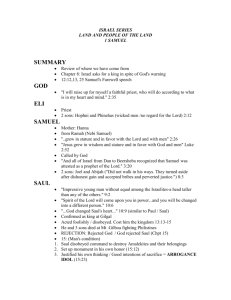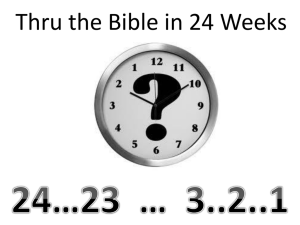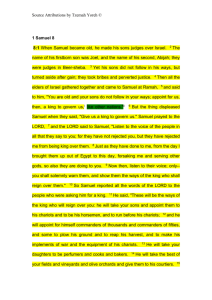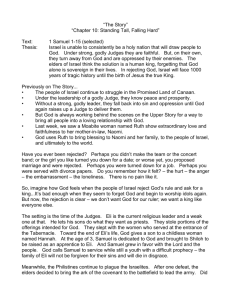Sermon Notes - Ventura Vineyard
advertisement
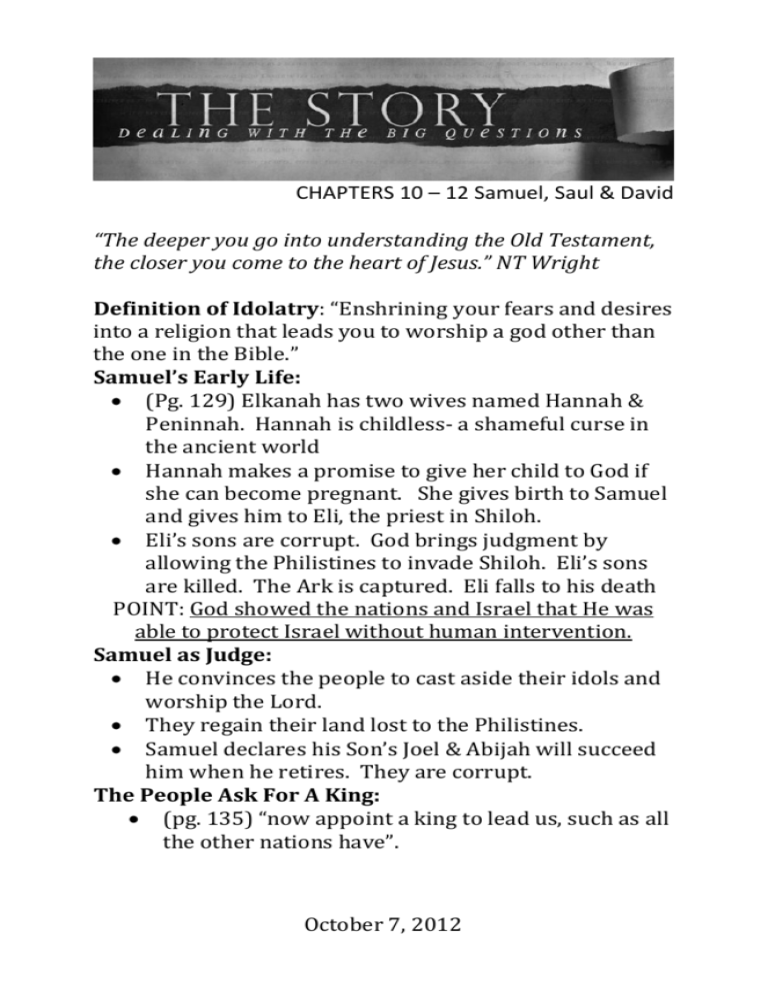
CHAPTERS 10 – 12 Samuel, Saul & David “The deeper you go into understanding the Old Testament, the closer you come to the heart of Jesus.” NT Wright Definition of Idolatry: “Enshrining your fears and desires into a religion that leads you to worship a god other than the one in the Bible.” Samuel’s Early Life: (Pg. 129) Elkanah has two wives named Hannah & Peninnah. Hannah is childless- a shameful curse in the ancient world Hannah makes a promise to give her child to God if she can become pregnant. She gives birth to Samuel and gives him to Eli, the priest in Shiloh. Eli’s sons are corrupt. God brings judgment by allowing the Philistines to invade Shiloh. Eli’s sons are killed. The Ark is captured. Eli falls to his death POINT: God showed the nations and Israel that He was able to protect Israel without human intervention. Samuel as Judge: He convinces the people to cast aside their idols and worship the Lord. They regain their land lost to the Philistines. Samuel declares his Son’s Joel & Abijah will succeed him when he retires. They are corrupt. The People Ask For A King: (pg. 135) “now appoint a king to lead us, such as all the other nations have”. October 7, 2012 God’s ideal plan was to use Israel as a witness to other Nations, to convince them the Lord is the one and true God. o First they would live separate, to build faith and settle the issue of obedience. o Ultimately they were called to invite others into their faith. To be inclusive of all people. POINT: Problem: Desiring a king was an idol for Israel because they had not learned to trust God. God Gives Israel A King: Samuel facilitates the transition. Samuel is the last Judge in Israel Samuel shares similarities to John the Baptist Warnings to Israel (pg. 135) o Your sons will serve in the Army o Have the young men run before his chariots o Make slave laborers o Take the best of your fields and vineyards o Use your property for his personal gain o Demand a tenth of your harvest and flocks Saul Selected as King (pp. 136-138) The people acknowledge they sinned by requesting a king. Samuel gives final warnings (pg. 141) Saul Is Disqualified For His Disobedience: (pg. 142) Saul does not obey Gods instructions. The people wanted a King. God knew their real motives so he gave them the quintessential king. Saul was strong, handsome, wealthy, distinguished family. His character flaws rendered him ineffective to lead people away from idolatry. October 7, 2012 David Is Selected King: Samuel is instructed to select the king from the house of Jesse. Seven Sons are presented. None are selected David is the youngest, a shepherd. Considered insignificant by his family and Samuel. Samuel anoints David King, however he will wait many years before he takes the throne. David defeats Goliath. Lives with Saul Saul tries to kill David. David lives “on the run” David waits for God to act on his behalf. He proves his character and devotion to the Lord. Saul is killed in Battle. David begins the process of becoming King over Israel Davidic Covenant: David establishes Jerusalem as the new capital and center of worship. He moves the Ark to Jerusalem and plans to build a permanent home (Temple) for the Ark.) God’s Promises that a descendant of David will be on the throne forever (pg. 159) The Purpose of a King: Deuteronomy 17:14 & Genesis 49: 10 God uses David to give an illustration of life when God is the King rather than mortals. David is a “Type” of Christ foreshadowing Jesus. Chapter 12 (pg. 61) We learn David’s Kingdom is not sustainable. David stays devoted to God while experiencing the consequences of his failures. Psalm 51 October 7, 2012 Small Group Questions 1. 2. 3. 4. 5. 6. 7. Chapter 10 tells the story of Hannah and her desire to have a child. Recall other times in the Biblical story when God answered a woman’s prayer for a child. What is significant about these events? What was Samuel’s role in Israel’s story? What were some of his strengths and weaknesses? What lessons can you learn from his life? You can’t judge a book by its cover. Explain how that statement applies to Saul and David. Saul does not follow God’s instructions and God rejects him as king. David commits terrible sins but God does not reject him. Why? What are the differences between Saul and David? It is God’s desire to reveal His presence, power, and plan to restore our relationship with Him. How do you see God doing each of those things in these chapters? Randy Frazee writes, “God can use our disobedient lives as effectively as he uses our obedient lives to work out his plan.” Jim spoke about Plan A and Plan B. Give some examples from these chapters to support their ideas. David’s life, even with his failings, still pointed people to God. How can God use your life―the good and the bad―to show His love, presence, and grace to the people around you? October 7, 2012
